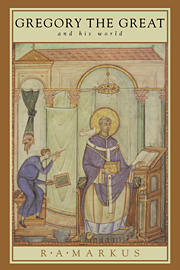Book contents
- Frontmatter
- Contents
- Preface
- List of abbreviations
- Maps
- 1 Introduction: a contemplative in a troubled world
- 2 Integritas animi: ministry in the Church
- 3 Sapienter indoctus: scriptural understanding
- 4 Appropinquante mundi termino: the world in its old age
- 5 The Christian community and its neighbours
- 6 Christiana respublica: within the confines of the Empire
- 7 Terra mea: Italy between two worlds
- 8 Argus luminosissimus: the pope as landlord
- 9 Scissum corpus: the schism of the Three Chapters
- 10 Ravenna and Rome: and beyond
- 11 In cunctis mundipartibus: the far West
- 12 Inconcussam servare provinciam: dissent in Africa
- Epilogue
- Appendix On the distribution of Gregory's correspondence
- Glossary of terms for offices
- Sources
- Secondary works referred to
- Index of Gregorian texts
- General index
4 - Appropinquante mundi termino: the world in its old age
Published online by Cambridge University Press: 05 June 2012
- Frontmatter
- Contents
- Preface
- List of abbreviations
- Maps
- 1 Introduction: a contemplative in a troubled world
- 2 Integritas animi: ministry in the Church
- 3 Sapienter indoctus: scriptural understanding
- 4 Appropinquante mundi termino: the world in its old age
- 5 The Christian community and its neighbours
- 6 Christiana respublica: within the confines of the Empire
- 7 Terra mea: Italy between two worlds
- 8 Argus luminosissimus: the pope as landlord
- 9 Scissum corpus: the schism of the Three Chapters
- 10 Ravenna and Rome: and beyond
- 11 In cunctis mundipartibus: the far West
- 12 Inconcussam servare provinciam: dissent in Africa
- Epilogue
- Appendix On the distribution of Gregory's correspondence
- Glossary of terms for offices
- Sources
- Secondary works referred to
- Index of Gregorian texts
- General index
Summary
NEARING THE END
Contemplative disposition and deep-rooted habits of ascetic reading encouraged Gregory's detachment from the world of his everyday experience. But this was not all. Preaching on an Advent Sunday, two days after a storm had destroyed houses and churches in Rome, Gregory saw the apocalyptic signs foretold by Jesus (Luke 21:25–33) being realised all round him:
Of these [predicted] things some we see already accomplished, others we expect with terror to come very soon. For we see nation rising against nation, their distress afflicting the lands – we see this in our time now more than we read about it in books. You know how frequently we have heard reports from other parts of the world of countless cities being destroyed by earthquake. Plagues we suffer without relief; we do not yet clearly see the signs in the sun, the moon, the stars, but we gather from the change in the air that these are not far off … As so many of the things foretold have already occurred, there is no doubt that the few that still remain will soon follow: for the experience of what has come to pass gives us certainty about what is to come.
Christians have always known they lived in the ‘last age’, the time between Christ's first and second comings. Their expectations of its end have varied. Although apocalyptic mood revived from time to time, and North African Christianity under Vandal occupation had been notably fertile ground for flourishing apocalyptic expectations, Augustine's agnosticism about the predictability of the end inhibited speculation about its imminence.
- Type
- Chapter
- Information
- Gregory the Great and his World , pp. 51 - 67Publisher: Cambridge University PressPrint publication year: 1997
- 2
- Cited by



